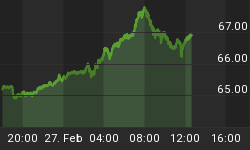Last week in an interview on CBS Network News, Economist Mark Zandi, the chief economist for Moody's, unwittingly revealed a central error of the global economic establishment. Zandi has made a career out of finding the middle ground between republican and democrat economic talking points. As a result of this skill, he has been rewarded with large quantities of airtime from media outlets that want to appear non-partisan, despite the fact that his supposedly neutral analysis often leaves listeners frustrated.
When asked about the recent deterioration in the global economy, Zandi said that "the worst possible scenario" at present would occur if Greece were to leave the Eurozone. He claimed that the economic gyrations and liquidations of bad debt that would result from such an exit would be sufficient to create a vicious cycle that could drag the global economy back into recession. As a result, he urged policy makers to take whatever steps necessary to maintain the current integrity of the 17 nation Eurozone.
Given what most economists now know, few would actively argue that Greece's entrance into the Eurozone back in 2001 was a good idea. In fact most concede it was a terrible idea based on bad forecasting and outright fraud. There is little disagreement over the fact that Greece grossly misrepresented its financial position in order to gain initial entry into the monetary union. It is also widely agreed upon that in the ensuing decade Greece exploited its monetary advantages to borrow irresponsibly.
Much has been written about how the fundamental misfit between Greece's economy and currency gave birth to a deeply flawed system that was destined to run off the rails. Most also agree that the countries like Greece and Germany are too economically and culturally disparate to exist under the same monetary umbrella. But despite all this, Zandi wants to maintain the status quo. In his opinion, it is so imperative to prevent the deflationary consequences of an economic restructuring that it is preferable to prop up a failed system, perhaps indefinitely, rather than allow a newer, healthier system to replace it. In the process, the moral hazard created not only assures that Greece will become an even greater burden on Europe, but so too will other nations whose leaders will be emboldened in their profligacy by the anticipation of similar help.
From Zandi's perspective (and he is certainly in the majority on this point) the goal of economic policy is to keep GDP growing. It follows then that he will oppose large-scale debt liquidations which drag down GDP in the short term. But sometimes debt needs to be liquidated. Bad ideas need to be abandoned. Once economies stop throwing good money after bad, capital is freed up to flow into more economically viable purposes. But economists and politicians never look at the long term. Their job seems to be to manage the economy for the next election.
The same "damn the torpedoes" mentality dominates economic thinking with respect to the U.S. economy as well. Years of artificially low interest rates, and government subsidies that direct capital towards certain sectors and away from others, has created an economy with too little savings and production, and too much borrowing and consumption. The ultra-low interest rates currently supplied by the Fed serve to perpetuate this unsustainable artificial economy. Higher rates would work quickly to redirect capital to the more productive sectors. But high rates could bring deflation and liquidation, which few economists are prepared to risk.
We have too many shopping malls selling stuff, but not enough factories making stuff. We have too many kids in college studying liberal arts, and not enough in the workforce acquiring skills that will actually increase their productivity. Banks are loaning too much money to individuals to buy houses, and not enough money to entrepreneurs to buy equipment. We have too many tax-takers riding in the wagon, and not enough taxpayers pulling it. The list is long, but the solutions are short.
We need to let interest rates rise to market levels, and allow the economy to restructure without government interference. We need to stop beating a dead horse and hitch our wagon to an animal that can really pull. The process will be painful for many, but like ripping off a band-aid, the pain will be over relatively quickly. However, since a painful restructuring means recession, politicians resist the cure with every fiber of their beings. So instead of a genuine recovery, one that will provide productive jobs and rising living standards, we get a phony recovery that produces neither.
Preserving a broken system merely to avoid the pain necessary to fix it only makes the situation worse. Propping up sectors that should be contracting prevents resources from flowing to other sectors that should be expanding. Keeping workers employed in nonproductive jobs prevents them from gaining productive employment elsewhere. Encouraging activity or behavior the market would otherwise punish discourages alternatives that it would otherwise reward.
Unfortunately, leaders on both sides of the Atlantic put politics above economics, and economists like Mark Zandi provide the cover they need to get away with it.
For in-depth analysis of this and other investment topics, subscribe to Peter Schiff's Global Investor newsletter. CLICK HERE for your free subscription.















